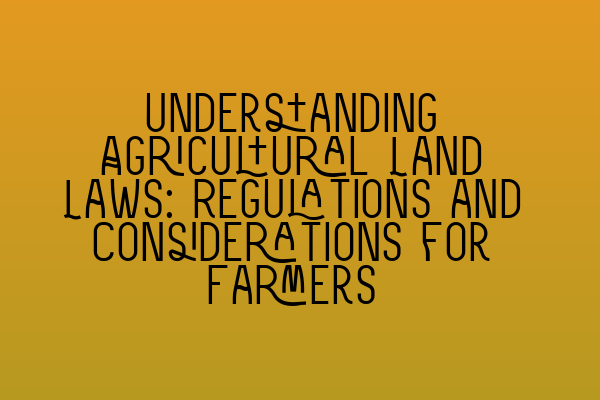Understanding Agricultural Land Laws: Regulations and Considerations for Farmers
Introduction:
Agricultural land laws play a crucial role in governing the use, ownership, and transfer of land specifically designated for farming purposes. These regulations ensure the protection and sustainability of agricultural land, safeguarding the interests of farmers and maintaining the integrity of the agricultural industry. As a farmer, it is essential to have a comprehensive understanding of these laws to navigate the complex legal landscape effectively. In this article, we will explore the key regulations and considerations that every farmer should be aware of.
1. Classifying Agricultural Land:
The first step in understanding agricultural land laws is to comprehend the classification of agricultural land. In the UK, agricultural land is categorized into different types, such as (insert relevant types, e.g., arable, pastoral, or mixed farming). Each classification has its own set of regulations and considerations that farmers must adhere to.
2. Ownership and Transfer of Agricultural Land:
In agricultural land transactions, it is crucial to be familiar with the legal requirements for ownership and transfer. Farmers should understand the procedures for buying, selling, or leasing agricultural land, ensuring compliance with the relevant regulations. It is highly recommended to consult with a solicitor specializing in property law to facilitate these transactions smoothly.
3. Tenancy Agreements and Farming Rights:
If you are a farmer who leases agricultural land, it’s essential to be aware of the rights and responsibilities outlined in your tenancy agreement. Understanding the terms related to rent, maintenance, and use of the land is vital for both landlords and tenants. Additionally, knowing the legislative protections available to agricultural tenants can help safeguard your interests in case of disputes.
4. Planning and Development Control:
Farmers often need to navigate planning and development control regulations when considering changes to their agricultural land. Whether it’s building structures, expanding operations, or diversifying agricultural activities, understanding the permission process and complying with relevant regulations is crucial. Familiarize yourself with the local planning authority’s guidelines and consult with a solicitor if needed.
5. Environmental Considerations:
The environmental impact of agricultural practices has become a significant concern globally. Compliance with environmental regulations is essential for sustainable farming and minimizing harm to the environment. Familiarize yourself with laws addressing issues such as pollution control, waste management, and protection of natural habitats. Staying updated on any changes in these regulations will ensure your farming practices remain environmentally responsible.
6. Grant Funding and Subsidies:
The agricultural industry often benefits from grants and subsidies offered by the government or other entities. Famers should be aware of the eligibility requirements, application procedures, and compliance obligations associated with these financial support programs. These resources can provide crucial assistance in investing in modern agricultural technologies, increasing productivity, or transitioning to sustainable farming practices.
7. Inheritance and Succession:
Planning for the future is essential, especially when it comes to agricultural land. Understanding the legal aspects of inheritance and succession is crucial for farmers who want to pass their land to future generations. Consulting with a solicitor specializing in land law can help you create a succession plan that aligns with your wishes and prevents potential disputes.
Conclusion:
Navigating agricultural land laws is vital for farmers to ensure compliance and protect their interests in the ever-evolving legal landscape. Familiarizing yourself with the regulations and considerations discussed in this article will equip you with the necessary knowledge to make informed decisions and effectively manage your agricultural land. Remember, seeking professional advice from solicitors specializing in property and land law is always recommended to ensure compliance and avoid potential pitfalls.
Related Articles:
1. “Updates in UK Property Laws: Key Changes and Implications”
2. “Legal challenges in property transactions: A comprehensive guide”
3. “Navigating Lease Laws in the UK: Essential Guidelines for Tenants and Landlords”
4. “Dominate Property Law Questions: Avoiding Common Pitfalls”
5. “Land Law Revision Tips: Ace Your Exam Preparation”
To access more articles related to property and land law, visit SQE Property Law & Land Law’s website at [Website link]
